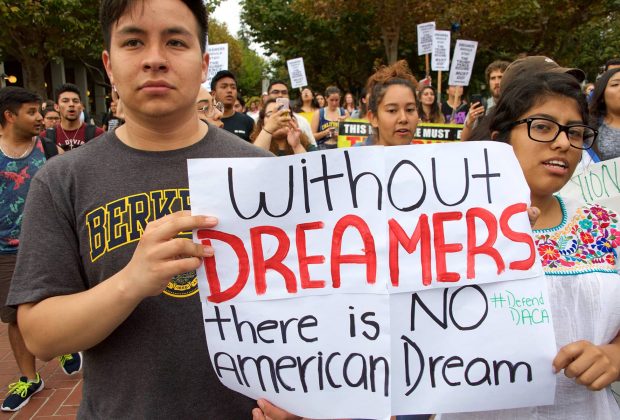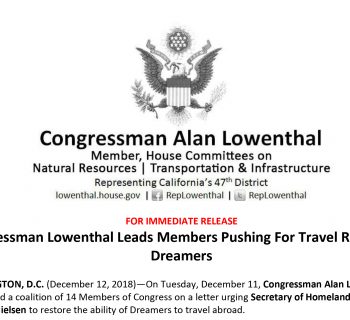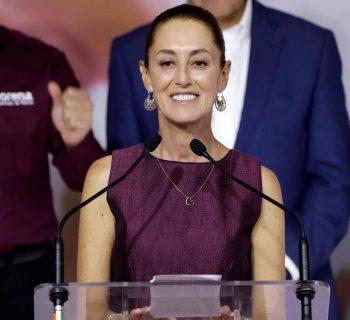|
HEARING SET FOR JUNE 1 IN TEXAS CASE SEEKING TO OVERTURN DACA
|
|
|
|
Report from B A & L | MAY 18, 2023 | Photo by Sheila Fitzgerald
|
|
A federal judge in Texas has set a hearing for June 1 in a case challenging the legality of the Biden administration’s Deferred Action for Childhood Arrivals regulation.
Key Points:
- Judge Andrew Hanen is hearing the case after the Fifth Circuit Court of Appeals ruled that the memorandum that created DACA in 2012 was unlawful but also asked the district court to consider the legality of the 2022 final rule.
- The Biden administration constructed the regulation to “preserve and fortify” DACA, but the states challenging the program say it “suffers the same flaws” as the 2012 memorandum.
- Currently, the Department of Homeland Security continues to adjudicate renewal applications (both DACA and employment authorization) and advance parole requests for existing DACA recipients; the agency remains prohibited from granting initial DACA requests and accompanying requests for employment authorization.
Analysis: Judge Hanen ruled in 2021 that the Obama administration did not follow proper procedures when it created DACA and is now weighing the Biden administration’s attempt to protect the program through federal regulation.
Given the uncertainty around the litigation, individuals who are eligible to renew their DACA and related employment authorization are urged to do so as soon as they are eligible. BAL will continue to monitor the ongoing litigation and will provide updates on important developments related to DACA... READ MORE
|
|

|
|
Click above to wach our latest video on the Winter 2023 Dreamers Study Abroad Program!
|
|
|
Opinion by Mariana Sarmiento Hernandez
The Nevada Independent | MAY 23, 2023 | Photo by Daniel Clark
|
|
As we commemorate the 11th anniversary of Deferred Action for Childhood Arrivals (DACA) on June 15, I am more certain now than ever that DACA was never enough. Most undocumented students in the Nevada System of Higher Education do not benefit from DACA protections and, because of the litigation surrounding DACA, it’s uncertain if they ever will.
There are an estimated 427,000 undocumented students in U.S. higher education, but fewer than half are eligible for DACA (Presidents’ Alliance on Higher Education and Immigration). Recent trends in immigration status among incoming TheDream.USscholars at Nevada State College over a five-year period indicate the number of undocumented students who do not have DACA is increasing and are now the majority.
As Nevada grapples with a worldwide health crisis, labor shortages and an uncertain future, it’s more important than ever for our state to reflect on the critical role that undocumented communities already play and could play in moving our state forward. We need immigration reform now.
Eleven years ago, I didn’t know I could go to college. That is until the day a friend’s mom, who was a Clark County School District teacher, gave me the email address to a staff member at UNLV. She said this presenter had mentioned the term “undocumented” in a training. That was enough for me to reveal my status and ask for help. I had nothing to lose. I’d never stepped into an administrative college building, but as I sat in a small cramped office on the third floor of the Flora Dungan Humanities building, I would come to learn a life-altering truth: I could go to college as an undocumented immigrant... READ MORE |
|
The California-Mexico Studies Center is please to announce a new collaboration with the Los Angeles County Department of Mental Health to host a virtual workshop series EVERY Sunday at 12pm (PST) until July 9th, 2023. This series is a resource for our students/participants/alumni!
For more information, CLICK the images below.
|
|
|
|
By Neil Genzlinger | The New York Times
MAY 21, 2023 | Photo by Damian Dovargnes
|
|
In three elections, she was a “first,” becoming one of the leading Latina politicians in California and the country.
Gloria Molina, a groundbreaking Chicana politician at the city, county and state levels in California who was a fierce advocate for the communities she represented, even though that often meant defying entrenched political structures, died on May 14 at her home in the Mount Washington neighborhood of Los Angeles. She was 74.
Her family announced her death, from cancer, on her Facebook page.
Since she announced she had terminal cancer in March, colleagues, constituents and the California news media had been praising her achievements in articles and on social media. The Los Angeles Metro’s board of directors voted to name a train station in East Los Angeles after her. Casa 0101, a performing arts organization in the Boyle Heights section of Los Angeles, designated its main stage theater as the Gloria Molina Auditorium. Grand Park, in downtown Los Angeles, which she helped bring into being in 2012, is now Gloria Molina Grand Park.
“She championed for years to increase access to parks and green spaces,” the park’s overseeing body said in announcing the renaming, “as well as recreational opportunities that engage culture, support well-being and improve the quality of life for everyone in Los Angeles.”
The accolades reflected her legacy as one of the leading Latina politicians in the country, with much of her more than three-decade career encompassing a time when few Latinas were in important positions.
In 1982, after working on other politicians’ campaigns, including that of Assemblywoman Maxine Waters, who would later be elected to Congress, Ms. Molina became the first Latina elected to the California Assembly. She ran for that seat even though the political leadership of the Eastside area of Los Angeles County had already selected another candidate, Richard Polanco. She beat him in the Democratic primary and easily defeated a Republican opponent in the general election... READ MORE
|
|
|
By Sylvia Foster-Frau | The Washington Post
MAY 18, 2023 | Photo by Karla Gachet
|
|
The city known for its Black culture has flipped majority Latino, but its leadership remains all Black. A group of Latino vaqueros want to change that.
COMPTON, Calif. — The riders on horseback clopped past corner stores and barking dogs, through busy downtown streets and along a creek feeding the Los Angeles River, spurs on their boots, sombreros on their heads and chaps riding up their calves.
“This is the forgotten Compton,” Rogelio Diaz said on a recent Sunday, while riding his 12-year-old horse, Yolie.
The city south of Los Angeles is known as one of the great hubs of Black culture, producing countless Black athletes, rap legends and other celebrities, including Serena and Venus Williams, N.W.A. and Kendrick Lamar.
But Compton is no longer a Black city. Forty years ago, the city’s population was 74 percent Black; now it is nearly 70 percent Latino.
On weekly rides, Diaz and other members of his nonprofit, Connecting Compton, want to remind the city’s 93,000 residents that vaqueros on horseback — a Mexican American tradition — are as representative of this community as the pop culture references for which it’s better known.
Public perception isn’t the biggest obstacle Compton’s Latino activists say they face to gaining greater recognition: The city’s leadership still reflects its demographic past, with an all-Black city council and school board. It has never had a Latino mayor. Its first and sole Latino council member was ousted last year after being accused of election fraud.
Latino activists attribute their lack of representation in Compton’s elected offices to a struggle to find candidates and traditionally low voter turnout, among other issues. In 2021, during the city’s last mayoral election, Latinos made up an estimated 38 percent of votes cast despite being 50 percent of registered voters, according to a Washington Post analysis of voter registration data from the political data firm L2. Black residents accounted for roughly 45 percent of votes cast, while making up only 32 percent of... READ MORE
|
|
|
SEND REMITTANCES WITH FINABIEN!
|
|
|

|
|
CLICK ABOVE TO WATCH VIDEO REPORT
|
|
|
By Amy Goodman | Democracy NOW! | MAY 23, 2023
Photo by Florida Immigration Coalition
|
|
A sweeping anti-immigrant crackdown is underway in Florida by Republican Governor Ron DeSantis, who is expected to enter the race for the 2024 Republican presidential nomination this week. SB 1718 is set to take effect July 1, but has already led to walkouts by immigrant workers. It bans people who are undocumented from using driver’s licenses issued in other states, and prohibits state ID cards to be issued to them. It also requires hospitals that accept Medicaid to ask about citizenship during intake, and expands requirements for employers to use the federal E-Verify system to check the immigration status of their workers. “SB 1718 has been the harshest immigration bill that we have seen,” says Florida immigration attorney Andrea Reyes. We also speak with historian Geraldo Cadava, who says DeSantis’s policies may not “translate nationally,” given Florida’s unique demographics and gerrymandered political system. Reyes is featured in a new piece for The New Yorker by Cadava, “Florida’s Right Turn on Immigration..." READ MORE |
|
|
By Teresa Watanabe | Los Angeles Times
MAY 18, 2023 | Photo by Jay L. Clendenin
|
|
The University of California regents, saying they support an equitable education for all, unanimously agreed Thursday to find a pathway to enact a bold policy to hire students who lack legal status and work permits.
The groundbreaking move would reshape the lives of thousands of young people who were brought to the country without papers as children and have lived precariously without legal access to jobs, research positions and career opportunities. California is home to about 1 in 5 of the nation’s college students without legal authorization.
The public university system has been under pressure to challenge a 1986 federal law barring the hiring of immigrants without legal status by asserting that it does not apply to states. A novel theory developed by UCLA law scholars argues that the federal law does not specifically include states — or UC, as a state entity — in its language establishing employer sanctions and therefore does not apply to them.
The regents voted to form a working group to examine that legal issue, along with practical considerations about how to roll out a policy that is already igniting controversy. But they made clear they are committed to their immigrant students and said the working group would complete its proposed plan by November.
“Absolutely, it is our intention to find a way to allow employment opportunities for all our students, regardless of their immigration status,” said Regent John A. Pérez, one of the key leaders in the effort to push a new policy forward. But he added the university needs time to work through the complex issue.
“This is too important to get wrong,” he said... READ MORE |
|
|
By Edwin Flores | NBC News | MAY 17, 2023 | Photo courtesy of AP
|
|
A vast majority of key topics are ignored or barely covered, including aspects of the Mexican-American War, the U.S. acquisition of Puerto Rico and racial segregation.
Most of the seminal events impacting U.S. Latino history are not a subject of study in high schools across the country, according to a new report by Johns Hopkins Institute for Education Policy and UnidosUS, a national Latino advocacy and research organization.
The study found that 87% of key Latino topics were either not covered in U.S. history textbooks or were mentioned in just five or fewer sentences.
"Only 28 of 222 important topics were covered well, leaving out many aspects of the Mexican-American War, the Spanish-American War, the U.S. acquisition of Puerto Rico, the Panama Canal, the modern civil rights movement, Cold War politics, and legal developments shaping the Latino experience, such as the Voting Rights Act, the Civil Rights Act, and racial segregation," according to a release on the report.
Over a quarter of the nation's K-12 public school students are Latino.
Researchers analyzed five U.S. history textbooks used in seven states and one AP U.S. history book. The study looked at the overall depiction of the Latino experience throughout the centuries, the balance between discussions about inequality and the Latino contributions to the U.S., the use of language and the authenticity of images.
The topics with the greatest depth of content were American land purchases from Mexico and Latin American foreign policy — a 1.4 out of a maximum of three. But when it came to coverage of U.S. Latino "firsts" from 1821 to the present, the coverage was the "thinnest" — a .1 out of three... READ MORE
|
|

|
|
Our first book "Anthology of Dreams from an Impossible Journey” has arrived! This glossy, 380-page, bilingual tome is jam-packed with photos and stories from the essays of our Dreamers Study Abroad Program participants. We want to ensure that as many people as possible can get a FREE copy. We ask only for a donation of $20 (USD) or 400 Pesos to cover shipping and handling. To receive your free copy, please fill out the order form found at www.california-mexicocenter.org/book-launch/
|
|
Please consider sponsoring our program today!!!
To be a sponsor contact Professor Armando Vazquez-Ramos at: armando@calmexcenter.org or 562-972-0986
|
|
|
Disclaimer: The California-Mexico Studies Center is a community-based California non-profit educational and cultural organization, established in 2010 and registered with the IRS as a tax-exempt charitable institution (ID: #27-4994817) and never affiliated with the California State University System or California State University Long Beach.
|
|
|
|
|
























